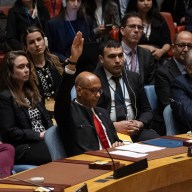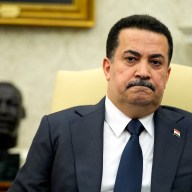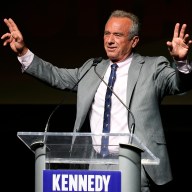WASHINGTON – U.S. President Barack Obama will host a meeting Tuesday with Israeli Prime Minister Benjamin Netanyahu and Palestinian Authority President Mahmoud Abbas in an effort to lay the groundwork for renewed negotiations on Mideast peace.
The meeting comes at a time when U.S. efforts were encountering strong resistance in the region.
The three-way meeting will take place immediately after Obama meets separately with each of the two leaders, White House press secretary Robert Gibbs said Saturday.
Netanyahu’s office said in a statement Sunday the Israeli leader “warmly accepts the invitation.”
Special Envoy George Mitchell says it is another sign of Obama’s commitment to comprehensive peace. The meetings will take place in New York on the sidelines of the United Nations General Assembly meeting.
No announcement is expected at the meeting of the three leaders, according to an administration official. But Obama scheduled the meeting to show his personal commitment to making progress, said the official, who spoke on condition of anonymity given the sensitivity of the discussions.
On Friday, the possibility of a three-way meeting had been in doubt because Mitchell failed to bridge wide gaps between Israelis and Palestinians.
Obama has set the renewal of Israeli-Palestinian peace talks as a major goal of his young presidency, and dispatched Mitchell as a White House envoy to soften the ground on both sides. Mitchell has had a hard go, with a new hawkish Israeli leader on one side and an increasingly dispirited Palestinian leader on the other.
Over four days, Mitchell met twice with Abbas and four times with Netanyahu, including twice on Friday before Mitchell left the Middle East.
The key disputes are over Israeli settlement expansion and whether peace talks should begin where they left off under Netanyahu’s predecessors.
Israel has balked at a U.S. demand that it freeze settlement construction in the West Bank and east Jerusalem, war-won territory the Palestinians want for their state. Under a U.S.-sponsored plan from 2003, Israel is required to freeze all such construction.
If next week’s three-way meeting is not based on a settlement freeze it will mark a further setback for the already weakened Abbas.
Netanyahu wants to continue building about 3,000 housing units on the West Bank, while offering to curtail other construction for several months. Nearly half a million Israelis have moved to the West Bank and east Jerusalem since Israel captured the territories in the 1967 Mideast War, and Palestinians fear the growing settlements will make a viable state impossible.
Secretary of State Hillary Rodham Clinton has been the most forthright member of the Obama administration in demanding a full stop to Israeli settlement in the West Bank and East Jerusalem. She has insisted on a halt to “natural growth,” the Israeli term for expansion to accommodate the children of the already large settler population.
Netanyahu and his defence minister, Ehud Barak, are veterans of past peace talks who took office this year opposed to new concessions to the Palestinians. Abbas had begun peace talks with Netanyahu’s scandal-tinged predecessor, Ehud Olmert, with little to show for it.
Barak is due to meet Defence Secretary Robert Gates on Monday.
The Bush administration had hoped to draw Olmert and Abbas into serious talks about issues that had not been on the table for years, including the borders of an eventual Palestinian state. Abbas was weakened from the start by an internal Palestinian division, and Olmert by his own political troubles. Their meetings were cordial but superficial, and more substantive staff-level discussions looked promising but ended up in a fizzle.
Abbas is locked in a power struggle with the Islamic militant group Hamas, which overran the Gaza Strip in 2007, leaving him only in control of the West Bank. Hamas has used lack of progress in negotiations to try to discredit Abbas.
–
Associated Press writer Ben Feller contributed to this report.
















